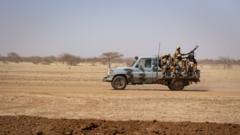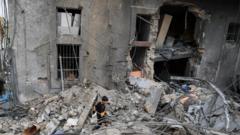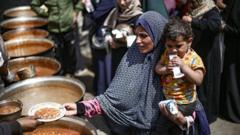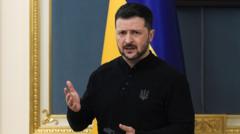An investigation into the involvement of three Ghanaians in the ongoing insurgency in Burkina Faso reveals a mix of personal grievances, ethnic ties, and financial incentives, as they navigate a dangerous conflict marked by violence and political ramifications.
Ghanaians Involved in Burkina Faso Insurgency: Perspectives from the Frontline

Ghanaians Involved in Burkina Faso Insurgency: Perspectives from the Frontline
The complex motivations and challenges faced by Ghanaians participating in the insurgency in Burkina Faso are unveiled through firsthand accounts of fighters caught in a cycle of violence.
Recent reports have surfaced detailing the engagement of Ghanaians in the severe conflict plaguing Burkina Faso, where jihadist groups have gained substantial control and the military struggles to restore order. This complex dynamic was explored through interviews conducted by the BBC with three men who have been involved in hostilities despite the dangers presented.
These individuals, in their late thirties to early forties, have been participating in the conflict since 2018, crossing the less fortified 550km-long border between Ghana and Burkina Faso undetected by authorities. Their motivations are as varied as the circumstances they have faced, with some driven by a desire to defend their communities from perceived threats, particularly following traumatic events where family members were killed by the Burkinabe military.
One fighter recounted the loss of his entire family, illustrating a personal vendetta against the military as a key motivator for his actions. Conversely, another expressed a sense of religious purpose linked to his involvement, with the belief that fighting against jihadists could ensure his passage to paradise. The complexities increase as views on targeting civilians divide among the fighters, one of whom admitted to retaliatory attacks against those perceived as supporting the military.
While acknowledging the rise in recruitment efforts among young Ghanaians, previous studies indicated limited success for jihadist groups in accessing fighters from Ghana. Nonetheless, these fighters claim a broader recruitment network exists across various ethnic backgrounds, driven by financial incentives through livestock theft, allowing them to fund their activities and sustain their communities.
The ongoing violence has led to the displacement of millions in the region, with many fleeing to Ghana for safety. Testimonies from refugees confirm the brutality of the conflict, emphasizing the indiscriminate targeting of civilians. This raises questions about whether the insurgency could spread into Ghana, which up till now has largely avoided direct attacks, though concerns are growing about potential spillover from the tensions in Burkina Faso and neighboring Togo.
With escalating violence in the northern Ghanaian community of Bawku, some fear that JNIM, an al-Qaeda affiliate operating in the region, might exploit local conflicts further, posing significant challenges to Ghana's security infrastructure. This has prompted responses from governmental leaders to prioritize peace initiatives while facing an apparent escalation in weapon smuggling, complicating the situation.
In conclusion, these narratives encapsulate the multifaceted nature of the conflict, where personal motivations, collective grievances, and external influences converge, warning of the potential continuation and spread of violence in the region. The fight in Burkina Faso resonates beyond its borders, entangling the prospects of peace within Ghana and its neighbors.





















